Lessons Learned from a Straight African Woman: Homophobia is UnChristian
Dear Readers,
A few weeks ago, I shared a short photo essay about my best friend, ChiChi. We’d been estranged for four years due to my sexuality and her Christian faith, but then recently reunited to find our friendship changed for the better.
Not only has it been as if we’d never been apart, but she’s now also one of my biggest cheerleaders; she donated over a thousand dollars to support my Africans for Africa project (via which I’m traveling through Southern Africa for 6 months, training African women’s and LGBT organizations in social media, communications, and storytelling).

When I published the piece, ChiChi was very moved, and told me that the only way she felt she could adequately respond was to write something for my blog. Hence, I’m so delighted to share her post with all of you.
All too often, ally voices are regarded with a deep (yet justified) suspicion; either allies are great, or not so great, advocates or saviorists. Due to our fear of being overshadowed, silenced, or having our narratives sidelined by society’s dominant voices, we rarely affirm their own stories. But there are certainly occasions in which we should.
In my experience, stories like “Confessions of a Straight Girl: What It Means to Be an Ally” (written by my Sister) or “My Straight African Brother’s Reflections on a Very Queer Christmas: Two Couples and a Sibling†resonate just as deeply with LGBT people of color who hope to someday experience love and acceptance from their families. I still receive emails from people who have been touched by how much I’ve shared about the ups and downs I’ve experienced with the allies in my life. Yet, we distance ourselves from their narratives, call them “allies” all the time — just to make sure they know their place. But these “allies”, sometimes, are simply the people we love, and hope to be loved by.
Given the ongoing battle between religion and sexuality, what ChiChi has shared below re: her faith, journey to deeper connection with God, her Love of me, and even her own exploration of her sexuality — not in spite of, but because of her faith — is nothing short of brave. This offering of Love from the place of a traditional practice of Christianity is most appreciated given how much oppression of LGBT exists in the name of religion.
I am very proud to share ChiChi’s words here, and encourage all of you — as we often preach — to affirm her own experiences with the Love and respect we expect in our lives. In any case, I hope her words encourage you, heal you, and give you hope that the loved ones you may have shunned you on the basis of religion will eventually come around.
Warmly,
Spectra
—————–
“Anyone Who Loves God Must Also Love Others”
When Spectra published “Keeping the Faith: Religion, Sexuality, and My Best Friend’s Pool Party” her piece about me, our friendship, the pain of 4 years apart, and the beauty and joy in our reconciliation, I was humbled and moved by how many people were touched by our story. The response to it reminded me of the power of stories to inspire, to unite, and to encourage. So I decided to write a response piece to affirm her words, and to tackle the loaded combination of religion and sexuality as I’ve experienced them.
For nearly four years, Spectra and I sought our identities in divergent paths—she as a queer activist, and I in exploring depth in my spiritual Christian faith. Because our paths seemed irreconcilable, I never anticipated that valuable lessons learned during my quest for a deeper relationship with God would bring me full circle back into relationship with my friend. But they did, and I’d like to share a few of the lessons I learned with all of you:
1) In my attempt to practice sexual abstinence, I have come to the conclusion that SEXUALITY is OVER-POLICED in Christian communities.
OK let me back up on this one—
In the 20 years that I have been Christian, the constant rhetoric in the Christian community has been that the sex life of a single, Christian woman should be, well, NON-EXISTENT. Therefore, as I grew in my knowledge and faith in God, I decided that I was not going to cut corners on the sexuality issue. I would practice sexual abstinence. Yes, I would remain abstinent until my wedding bed where with multiple orgasms, my husband will make the wait well worth it, and from thence we will live together in a one-partner, heterosexual marriage till death do us part.
But while this paradigm worked for me, was this the “correct” sexuality for everyone? Is there such a thing as “correct” Christian sexuality? What about those people for whom there is no biblical precedent, e.g. intersex individuals? What does a “heterosexual” marriage look like for them?
If abstinence is always the way to go, why is there an epidemic within the Catholic church of repressed priests unleashing on little boys and girls? Why is masturbation discouraged? Why does the Pope get to have an opinion on how a man and his wife should stem the number of children they would have? And, hmmm… why am I, suddenly, physically unable to insert this tampon???
Yup. In my abstinence practice, I unwittingly programmed the muscles around my vagina to SLAM SHUT when anything approached. And because the contraction was involuntary, gynecological examinations and tampon insertions had suddenly become terribly difficult. Even when I wanted to “open sesame”, it’s was like my vagina never received the override memo. (This is a sexual condition. It’s called vaginismus. If you’ve never heard of it, read about it here.)
Luckily, I don’t have this issue anymore. A couple investments in books and toys, and I was able to RETRAIN my vagina to function correctly. But more importantly, I learned that any sexual practice that undermines YOUR PERSONAL spiritual, mental, emotional, AND/OR physical health cannot be “correct” for you.
2) At the Core of My Faith is LOVE
The more I learned about God, the more I learned to open my heart, to be vulnerable, to be humble, to admit when I have been wrong, to ask for forgiveness, and to LOVE. Why? GOD IS LOVE. From the bible:
(1st book of John, Chapter 4, verses 7-9)–
7- Dear friends, let us love one another, for love comes from God. Everyone who loves has been born of God and knows God. 8- Whoever does not love does not know God, because GOD IS LOVE. 9- This is how God showed his love among us: He sent his one and only Son into the world that we might live through him.
3) Homophobia is UNChristian. (phobia = fear, hate)
Again, the Bible says this is so:
(1st book of John, Chapter 4, verses 18-21)–
18- There is no fear in love. But perfect love drives out fear, because fear has to do with punishment. The one who fears is not made perfect in love. 19- We love because he first loved us. 20- Whoever claims to love God yet hates a brother or sister is a Liar. For whoever does not love their brother and sister, whom they have seen, cannot love God, whom they have not seen. 21- And he has given us this command: Anyone who loves God must also love their brother and sister.
4) People are PEOPLE, not ISSUES.
When Spectra first came out to me, in an attempt to avoid coming to terms with her new identity, I instantly compartmentalized her being out as “her politics†and “her sexuality†which I placed as separate entities from the Spectra that was my college bestie, my sister. When she realized this, we had the falling out. As painful as the period apart was, it was important that it happened so that I could learn to wrestle with the issues that made me uncomfortable instead of simply sweeping it under its compartment. It was important that I learned to love her COMPLETELY in the way that she deserves to be.
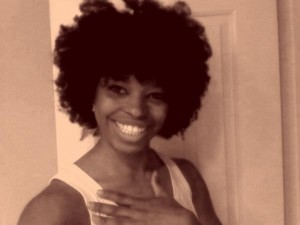 So there you have it: four lessons learned from four years deepening my relationship with God and re-commitment to practicing the core principles of my faith. I hope it offers some guidance to Christians who are still struggling to reconcile their spirituality with the LGBT community. Choose Love. It always wins.
So there you have it: four lessons learned from four years deepening my relationship with God and re-commitment to practicing the core principles of my faith. I hope it offers some guidance to Christians who are still struggling to reconcile their spirituality with the LGBT community. Choose Love. It always wins.
Spectra, I love you. Â I am proud that your search for yourself culminated in the unearthing of the earth-changing, ass-kicking, turn-the-universe-up-on-its-head, Nigerian, Igbo, queer, activist tour-de-force that you are. And I pray that as you travel to spread your love, knowledge, and solidarity at home in Africa, God will guide your path, and reveal to you all his plans for you. AMEN.
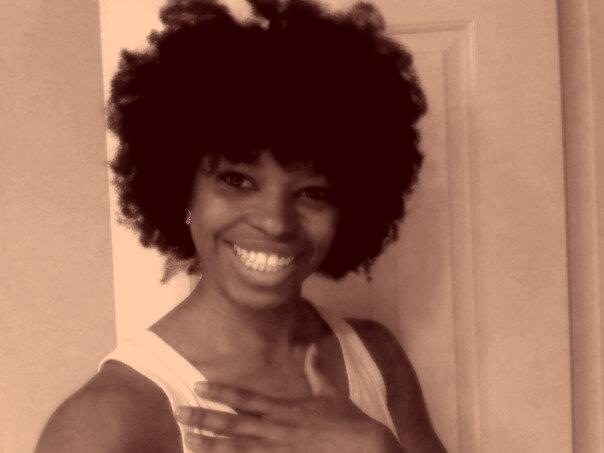
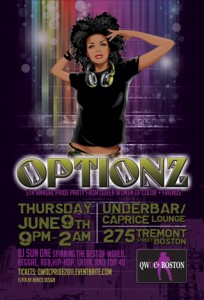
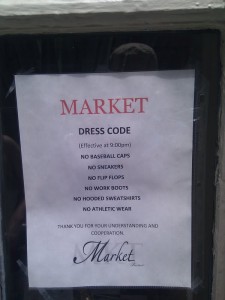 Great decision. Excellent. Yay for saying no to racism! But what I didn’t tell people, was that the new venue had a similar (albeit less overtly racist) dress code policy; a variation of the all too familiar Boston ‘dress code’ which goes something similar to “No hats, no sneakers, no do-rags, no athletic wear… women in dresses/skirts, men in collars etc” was prominently displayed on the wall by the entrance to their establishment. Here’s the picture on the right.
Great decision. Excellent. Yay for saying no to racism! But what I didn’t tell people, was that the new venue had a similar (albeit less overtly racist) dress code policy; a variation of the all too familiar Boston ‘dress code’ which goes something similar to “No hats, no sneakers, no do-rags, no athletic wear… women in dresses/skirts, men in collars etc” was prominently displayed on the wall by the entrance to their establishment. Here’s the picture on the right.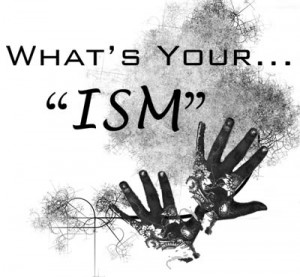
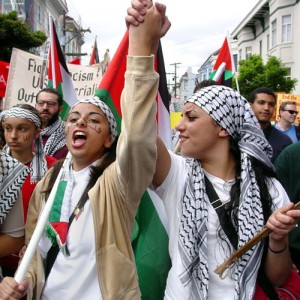 Activism, for so many of queer women of color, is a constant negotiation of which ism to address. We don’t have the luxury of snubbing everyone that offends us, or we would have no where to go. We can’t — and shouldn’t have to — fight everyone. As a direct consequence, for queer women of color, standing up for what is ‘right’ in the face of racism, sexism, transphobia, xenophobia — all issues that significantly impact our community — can sometimes mean drastically limiting access to resources that we need as a community. So, whereas we should never compromise our ethics (as in this case — for the sake of a good party), QWOC+ Boston’s work isn’t just about one event, not just about today. I don’t think that I speak out of turn when I say that we all work our asses off so that tomorrow can be better, for everyone.
Activism, for so many of queer women of color, is a constant negotiation of which ism to address. We don’t have the luxury of snubbing everyone that offends us, or we would have no where to go. We can’t — and shouldn’t have to — fight everyone. As a direct consequence, for queer women of color, standing up for what is ‘right’ in the face of racism, sexism, transphobia, xenophobia — all issues that significantly impact our community — can sometimes mean drastically limiting access to resources that we need as a community. So, whereas we should never compromise our ethics (as in this case — for the sake of a good party), QWOC+ Boston’s work isn’t just about one event, not just about today. I don’t think that I speak out of turn when I say that we all work our asses off so that tomorrow can be better, for everyone.